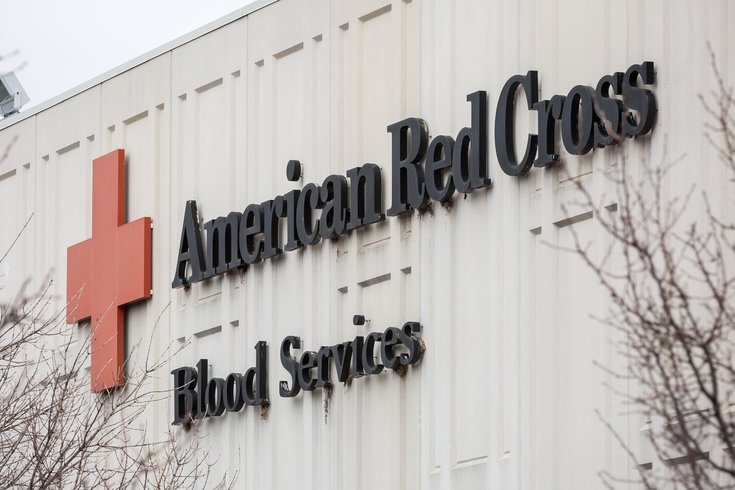
January 12, 2022
 Thom Carroll/PhillyVoice
Thom Carroll/PhillyVoice
The American Red Cross declared its first 'blood crisis' amid a national shortage that has limited its deliveries to hospitals. The organization is urging people to donate or organize blood drives.
The American Red Cross is facing its largest blood shortage in more than a decade.
The COVID-19 pandemic has resulted in a 10% overall decrease in blood donations and a 62% drop in high school and college blood drives. Students accounted for 25% of donors in 2019, but that figure has since dropped to 10%.
The shortages have forced the Red Cross to declare its first "blood crisis" and limit the amount of blood supplied to hospitals in need. Some hospitals only may receive one-fourth of the blood requested, which could result in delayed operations.
"While some types of medical care can wait, others can't," said Dr. Pampee Young, chief medical officer of the Red Cross. "Hospitals are still seeing accident victims, cancer patients, those with blood disorders like sickle cell disease, and individuals who are seriously ill who all need blood transfusions to live even as omicron cases surge across the country."
People looking to help with the relief effort in an active way can organize their own blood drives in support of the Red Cross. Here are some tips to get started:
The Red Cross has been majorly impacted by the COVID-19 pandemic. Hosting a blood drive, particularly in an area less impacted by COVID potentially could save lives in areas most impacted.
People who would like to apply to host a blood drive can start the process by filling out this online form. It requires applicants submit personal contact information, and estimate the number of donors they reasonably expect to recruit for their drives.
Local organizations, including churches and community organizations, are encouraged to apply and host their own drives. The Red Cross suggests to choose a location with a lot of open space.
As long as the host has enough volunteers willing to coordinate donors and the necessary space, the Red Cross will provide the supplies and staff needed to run the drive.
After the form is submitted, a Red Cross representative may reach out to get the drive started or provide additional information on finding other blood drives that need volunteers.
Whole blood donation requires donors to be in good health, and be at least 16 years old in Pennsylvania, or 17 years old in New Jersey. A parental consent form may be required for minors seeking to donate blood.
All donors must weigh at least 110 pounds. Teenagers ages 18 or younger have additional height and weight eligibility requirements.
People with chronic illnesses — including diabetes — who want to donate must be in good health and have their illnesses in order. There are other illnesses that may impact a person's eligibility to donate blood, including hepatitis, asthma and heart disease. A full list and explanation of donor eligibility issues is available through the Red Cross.
People who have received a COVID-19 vaccine are eligible to donate as long as the vaccine was inactive — which includes all three authorized in the United States (Pfizer, Moderna and Johnson & Johnson). People who are unsure whether they received a live COVID-19 vaccine should wait two weeks from their most recent doses to donate blood.
The Red Cross has shifted the design of its blood drives to mitigate the risks of transmitting COVID-19. Beds are placed at least six feet apart and masks are required at all times. Surfaces are sanitized frequently.
A callback number will be provided by the Red Cross for people who become sick in the days after donating blood.
For people who want to get involved but do not feel safe enough to go in-person, the Red Cross encourages them to promote blood drive campaigns virtual by using its SleevesUp program.
Virtual campaigns are helpful for people who want to host their own blood drive but do not have enough people, or those who are concerned about large groups of people in one place. People can simply make a free account, create a campaign, and share the campaign on social media to promote blood donation.
For people who simply want to find a blood drive near them, the Red Cross has a searchable tool to find available appointments for blood and platelet donations. People can search by zip code.
Those who attend a blood drive must bring a form of primary identification, like a driver's license or state ID card, or two forms of secondary identification, like a school ID card, birth certificate or social security card.
Donors should get at least eight hours of sleep the night before their donations, and make sure to eat ahead of time. The Red Cross recommends taking a multivitamin with iron following donations to replenish the body's supply of iron.
"Every community in America needs blood on a daily basis. At a time when many businesses and organizations across the country are experiencing pandemic challenges — the Red Cross is no different," Young said. "And while we are all learning how to live in this new environment, how we spend our time, where we work, how we give back, how we make a difference in the lives of others — donating blood must continue to be part of it."
As part of January's National Blood Donor Month, the Red Cross partnered with the NFL to incentivize blood donation. Anyone who donates blood or platelets throughout January will be entered to win two tickets to the Super Bowl on Feb. 13 in Los Angeles.